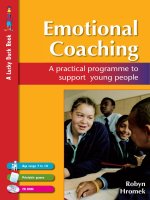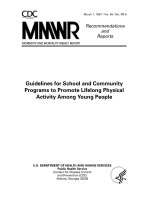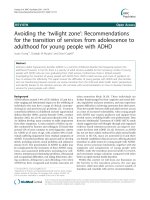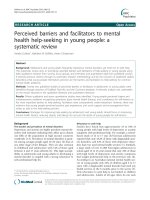8 bounce back teaching resilience to young people helengrath
Bạn đang xem bản rút gọn của tài liệu. Xem và tải ngay bản đầy đủ của tài liệu tại đây (12.25 MB, 59 trang )
/>
Why teach young people to be resilient?
Human resilience is the capacity to cope well
with times of adversity or hardship (and
even be strengthened by them). It is the
ability to bounce back from difficult times to
a fulfilling life while retaining a positive
sense of self.
Courage
Managing feelings
Humour
Relationship skills (based on pro-social values)
Self-knowledge (eg ability & character
strengths)
Goal setting skills (eg persistence, problemsolving, resourcefulness, planning)
Optimistic thinking skills
Helpful thinking skills (eg not catastrophising)
Post-traumatic Growth?
This is more likely to happen in young
people when:
• They have been taught skills for problemsolving, coping and optimistic thinking
(especially positive reinterpretation and realistic
recognition of both losses and gains)
• They are given caring social support from
adults and peers and opportunities to share
and learn from their experiences and feelings
Second Edi*on
K to 2
Years 3 to 4
Years 5 to 8
9
Developed and trialled in 2001 with funding from
DET (Victoria) as part of drug education.
Adopted by thousands of Australian primary schools
as part of their approach to wellbeing and
behaviour (secondary schools use it as pastoral care).
KidsMatter (2008-2009) was a $12m initiative of the
Australian Commonwealth Government + Principals
Australia + Australian Psychological Society +
Beyond Blue. Funding was given to 101 primary
schools to teach social and emotional skills to their
students. 64% of the schools that selected a
curriculum program selected Bounce Back!
Bounce Back! Awards
First edition received the 2003 Robin Winkler
Award for Excellence in Applied Community
Psychology by the Australian Psych Society
The Perth-Kinross Educational Authority in
Scotland was awarded a silver community
project medal in 2010 for the successful
implementation of Bounce Back! in 35 of their
district primary schools.
Winner of the 2010-2011 award for The Best
Australian Teaching Resource for the second
edition (Australian Publishers Association)
Other Bounce Back! Implementations
In 2010 the Victorian Department of
Education and Early Childhood (DEECD)
provided local community mental health
professionals and teachers in 46 bushfireaffected schools to receive books and
training as part of their Bushfire
Psycho-social Recovery Project (and
copies have since been sent to floodaffected schools)
In the aftermath of the fires we found
the activities and themes embodied in
the Bounce Back! program really
helped us to get our students
expressing and dealing with their
emotions. It has become an integral
and highly valued part of our teaching
and learning program. Our students
are more empathic, in tune with their
emotions and able to see positives
because of the work we do in this
area.
PRINCIPAL
(Bushfire-affected School)
13
The students often bring the Circle
Time discussions round to aspects
of the bushfire situation
TEACHER
(Bushfire-affected School)
14
Bounce Back has allowed us to talk
usefully about some very sad
things
TEACHER
(Bushfire-affected School)
15
I talked with my family about it
and now my parents say it back to
me - it’s not the end of the world,
bad times don’t last etc.
I discussed the ideas with my
parents and they already knew
them
STUDENTS
16
Other Bounce Back! Implementations
Parts of the program have also been
implemented in a Cambodian
orphanage and in some South African
schools
The Blossom Project uses some of the
materials and key principles from the
program
21
The BOUNCE BACK Acronym
Bad times don’t last. Things get better. Stay optimistic
Other people can help if you talk to them. Get a reality
check
Unhelpful thinking makes you feel more upset. Think
again
Nobody’s perfect. Not you and not others.
Concentrate on the positives, no matter how small and
use laughter
Everybody experiences sadness, hurt, failure, rejection,
and setbacks sometimes, not just you. They are a
normal part of life. Try not to personalise them
Blame fairly. How much of what happened was
because of YOU, OTHERS or BAD LUCK
Accept what you can’t change and try and change
what you can
Catastrophising exaggerates your worries. Don’t
believe the worst possible picture
Keep things in perspective. It’s one part of your
life.
ABOUT BOUNCE BACK









